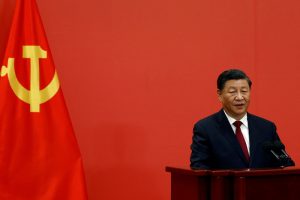China’s tech titans such as Alibaba, Tencent and Pinduoduo are backing President Xi Jinping’s call for ‘common prosperity’ and for successful companies to “adjust” high income levels to help narrow the country’s wealth gap.
President Xi’s call was seen as “a prod for wealthy individuals and companies to ‘give back to society’ “, according to the South China Post, which noted that it was owned by Alibaba and that the e-commerce company was “making the single biggest corporate pledge in response to the government’s call” – of $15.5 billion (100 billion yuan).
It also noted that Alibaba’s founder Jack Ma is one of the wealthiest entrepreneurs in the country.
A spokesperson for Alibaba Group confirmed the news on Thursday.
INSIGHTS: Explainer: How ‘Common Prosperity’ is Changing China
The Zhejiang Daily, a government paper in Zhejiang Province where Alibaba has its headquarters, said the company’s $15.5-billion would be invested over five years and would go towards small and medium enterprises and agriculture, with 20 billion yuan going to a “common prosperity development fund” for the province.
Two weeks ago Alibaba said that promoting rural revitalisation, common prosperity and green sustainability would be at the core of the company’s public welfare and social responsibilities.
Meanwhile, online music and gaming giant Tencent Holdings, also said it would invest 100 billion yuan ($15.5 billion) on common prosperity, while Pinduoduo, another e-commerce site, vowed to give 10 billion yuan.
Other wealthy institutions are also backing the President’s call.
“A branch of Agricultural Bank of China in East China’s Zhejiang Province, the pilot zone for common prosperity, has vowed to provide 150 billion yuan over five years to local enterprises, in order to boost industry and talent development, media reported on August 5”, the state-owned tabloid Global Times said on August 19.
News about the billions of dollars being directed to these socially-minded endeavours has had analysts wondering if this corporate largesse will erode companies’ market value and take away funds that otherwise would have been invested for growth – or whether it might boost the companies standing and improve their business.
Time will tell.
• By Jim Pollard and Reuters.
ALSO ON AF:
Unleashing Reforms, Xi Returns To China’s Socialist Roots
What Is China’s ‘Common Prosperity’ Drive and Why Does It Matter?
























